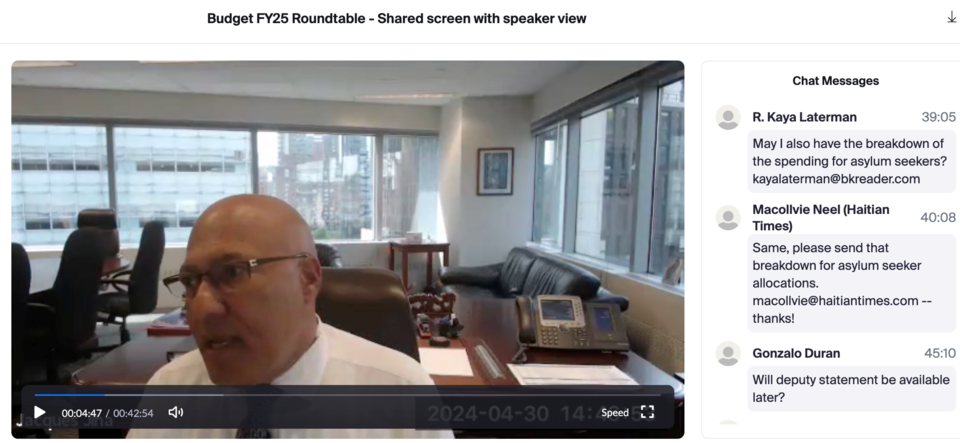Jacques Jiha, director of the New York City Mayor's Office of Management and Budget, held a press briefing on Tuesday outlining the mayor’s strategy for the city, following the recent $225 billion FY 2025 state budget approval.
In his capacity as OMB Director, Jiha supervises New York City's fiscal policy, including the formulation of the expense and capital budgets, the City's bond and borrowing program, and the budgets of over 90 City agencies and entities.
He identified three primary factors contributing to the city’s unprecedented budget shortfalls, namely the unforeseen migrant crisis, insufficient federal aid for addressing the crisis, and escalating interest rates.
Consequently, Jiha explained that the mayor deemed it necessary to make difficult decisions regarding expenditure, savings, and a potential hiring freeze. This involved initiating a Program to Eliminate the Gap (PEG) in November 2023, January, and April 2024, each targeting a five percent reduction through spending and hiring freezes.
PEGs, as defined by NYC government, aim to achieve budgetary savings by reassessing internal processes and policies within City agencies, optimizing resource utilization, and reevaluating expenditure estimates.
“Our objective was to take charge of our fiscal trajectory,” Jiha remarked regarding the migrant crisis. He expressed hope that if the state provided financial assistance, it could negate one of the PEGs and reinstate some savings. “Moreover, we aimed to accomplish all this without resorting to property tax hikes, employee layoffs, or significant service disruptions.”
Jiha affirmed that with the state budget approval, the city’s executive budget is now balanced at $111.6 billion.
He confirmed earlier reports of a $2.2 billion surplus in tax revenues, attributed to recessionary expectations (the Federal Reserve raised interest rates 11 consecutive times in 2023). Despite this, New York City's economy demonstrated resilience, leading to the surplus.
“As such, the mayor opted to eliminate the [April] PEG savings from the executive budget and reinstate nearly $80 million in previously canceled initiatives,” Jiha stated.

This encompassed funding for cultural institutions and the reinstatement of the July and October NYPD classes, with plans to add 2,400 officers this year. However, many short-term stimulus funds are nearing expiration, potentially resulting in the elimination of other programs. Nevertheless, the city has managed to replenish $500 million in programs previously funded by stimulus money, including literacy programs, Pre-K, and community schools.
“We have addressed three challenges: achieving a balanced fiscal budget for 2025, reinstating programs previously funded by stimulus dollars, and addressing the migrant crisis, all without any layoffs, tax hikes, or significant service disruptions,” Jiha noted.
Currently, the budget reserves stand at approximately $8.2 billion.
“Nevertheless, challenges persist,” Jiha cautioned, citing geopolitical risks and an anticipated economic slowdown. “Yet overall, we believe we are in a considerably stronger position today than just a few months ago.”
“We eagerly anticipate collaborating with the City Council to address the administration's priorities as we approach budget adoption in June.”



.png;w=120;h=80;mode=crop)
